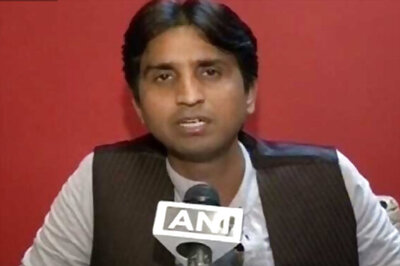
views
Fear may be the key to pre-poll alliances, but Mayawati can afford to be fearless. The BJP bogey frightens the Congress more than it does the regional parties. So the BSP supremo, consicous of the dichotomy between her long-term game plan and Rahul's short-term strategy, lived up to her name and put an end to illusions of a pan-India alliance.
Mayawati is in a position to play hardball, with the 'bua-bhatija' (SP-BSP) deal in Uttar Pradesh (for the Lok Sabha) all but sealed. Outside her core state, in Madhya Pradesh, Rajasthan and Chhattisgarh, the immediate electoral returns on a tie-up with the Congress for the upcoming Assembly elections aren't large enough to justify the long-term costs.
The Congress and the BSP are not natural allies, because they draw support from similar social groups. By contrast, the SP and BSP have a dissimilar support base, which makes for a comfortable alliance. They've had sporadic tussles over the minority vote, but the SP has come out on top.
The importance of being Mayawati lies in her success in long tail marketing; by fighting elections across the country, she has gained small but crucial slices of the vote share. The icing on the cake is that her vote bank is transferable, whereas other parties cannot offer her a reciprocal share.
So, in states where the margins between the BJP and the Congress are slim, she can make the difference between defeat and victory. Congress state units in MP and Chhattisgarh were thus keen on an alliance, whereas in Rajasthan, local leaders did not think it would matter.
Mayawati's clear preference for other regional players over the grand old party belies claims by political analysts that the BSP had more to gain from an alliance with the Congress than the other way around. She has tied up with Ajit Jogi's Janta Congress in Chhattisgarh and the INLD in Rajasthan, has an alliance with the JD (U) in Karnataka and is in talks with the NCP in Maharashtra.
In MP, her 6.3 per cent vote share is larger than it looks, because it is geographically concentrated and enabled her to win 4 seats in 2013. What's more, it comprises not just Dalits – who account for 15 per cent of the population – but OBCs as well. She has potential for growth in the state and she knows it.
The Congress, inspired by calculations that a pre-poll alliance with the BSP in 2013 would have reduced the BJP tally by 41 seats, knew it had more to gain from a tie-up than she did and was at pains to allay her fears. Party leaders admit they were willing to yield more than the 15 seats Mayawati claimed she was offered. Until the very last minute, MP Congress chief Kamal Nath was dismissing her pre-emptive list of 22 candidates and claiming that seat-by-seat negotiations were underway.
Likewise, in Chhattisgarh, where Dalits constitute 11.6 per cent of the population, she has a 4.3 per cent vote share (and one MLA). A Congress-BSP alliance in 2013 may well have reduced the BJP's seat share by 11 and prevented it from forming the government.
The Congress is inclined to cry foul. Rumours that Mayawati is under pressure from the BJP, after investigations into her family's dubious property deals by regulatory agencies, have been doing the rounds for months. Only motormouth Digivjay Singh has dared to say so out loud. Her counter, on the casteist mindset of the Congress, hits close to the bone in a party still dominated by upper castes.
Anyhow, it appears that Mayawati had made up her mind much earlier, for reasons of realpolitik and not because she was being bullied. At the same time, she's hedging her bets by saying good things about Sonia and Rahul Gandhi's 'honest' intentions vis-a-vis the BSP (as usual, nameless Congress leaders figure as the villains of the piece, intent on sabotaging the alliance).
In the Lok Sabha as opposed to Assembly elections, Mayawati will be more open to allying with the Congress. She is likely to accommodate the party in UP, on the premise that it will eat into the BJP's upper caste votes. Besides, there is the possibility of a post-poll alliance at the national level.
The poll math is never as simple as it seems. The premise of an alliance is that it aggregates votes of multiple parties behind a single candidate, maximising chances of winning the seat. But, as mentioned above, votes are not always transferable. A small party can win more seats in a multi-party contest with the support of a larger party, but such gains will be short-term, a fact of which the BSP leaders is well aware.
Mayawati's strategy for the Assembly elections and for the Lok Sabha are two very different things, so it is far too early for the BJP to celebrate a low 'index of opposition unity'.
(The writer is a senior journalist. Views expressed are personal)


















Comments
0 comment